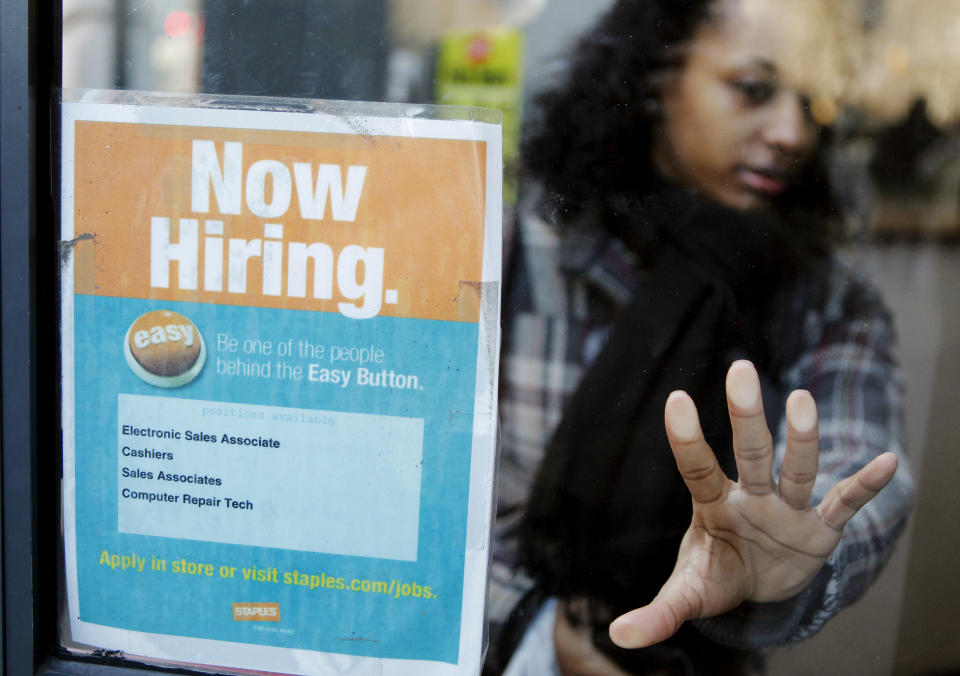Some Americans could lose unemployment benefits with eligibility requirements changing
Many jobless Americans will soon have to meet one more requirement to be eligible for their unemployment benefits: to be actively searching for a job.
States are beginning to reimpose a job search requirement as part of the unemployment insurance application, which may make the application process more complicated for some.
“A lot of times these work requirements are that you have to apply or contact five different employers each week,” Gbenga Ajilore, a senior economist at the Center for American Progress, a non-profit for public policy research and advocacy, told Yahoo Money.
There were 3.9 unemployed Americans for every job opening as of May 2020, and millions of Americans are expected to stay unemployed for months as the coronavirus pandemic continues to restrict various parts of the country.
“It's unfair for them not to be able to receive benefits if there's nobody hiring,” Ajilore added.

Read more: How to find a job after a layoff
To meet the work search criteria, unemployed Americans have to apply for one to five jobs a week depending on the state they’re in. The requirement exists in all states but was waived due to the pandemic in exchange for emergency federal funding. The work search requirement is being reinstated on a state-by-state basis.
Read more: Here’s what you need to know about unemployment benefits eligibility
The states that have already reimplemented the requirement or are about to include Arkansas, Colorado, Florida, Maine, Missouri, Nebraska, North Dakota, and South Dakota. (The requirement usually applies only to Unemployment Insurance (UI) recipients and not to Pandemic Unemployment Assistance for Americans who are self-employed workers or independent contractors.)
“Businesses are returning to normal and in need of quality applicants,” South Dakota Labor and Regulation Secretary Marcia Hultman said in a statement.
At the same time, many of those states are seeing an uptick in coronavirus cases and hospitalizations.
“At a lot of places we saw, towards the end of June early July, a huge spike in cases,” Ajilore said. “We go back to the same problem that we had in March, people are not going to be able to fulfill those requirements and this is going to get them booted from unemployment insurance.”

‘Any way they could make it harder ... states are going to do that’
By reimplementing restrictions, states may be looking to limit spending on the unemployment insurance payout.
“They don't want to pay out as much in unemployment benefits,” Ajilore said. “Any way they could make it harder for people to collect unemployment, states are going to do that.”
This comes as unemployed Americans lost the additional $600 of weekly unemployment benefits, resulting in them losing a big part of their employment check.
Read more: How to find a job in a tough economy
Ending the waiver will be particularly hard on low-income households who have been hit hard by the pandemic in terms of job loss and already lost out the most after the extra $600 in weekly unemployment benefits expired at the end of July while Congress works out a new deal.
Workers in rural communities also may not be able to meet the work search requirement due to the lack of options.
“Rural communities just don't have that many employers,” Ajilore said. “Some requirements are that you need to apply to a number of different employers, and there are only three employers in your neighborhood. Then you can by design, by definition, can't fulfill it.”
Denitsa is a writer for Yahoo Finance and Cashay, a new personal finance website. Follow her on Twitter @denitsa_tsekova.
Read more:
Rich Americans' pullback in spending is hurting the economic recovery
Even as GDP tanked, personal income grew thanks to government support
Read more personal finance information, news, and tips on Cashay
Follow Yahoo Finance on Twitter, Facebook, Instagram, Flipboard, SmartNews, LinkedIn, YouTube, and Reddit.

 money
money 

